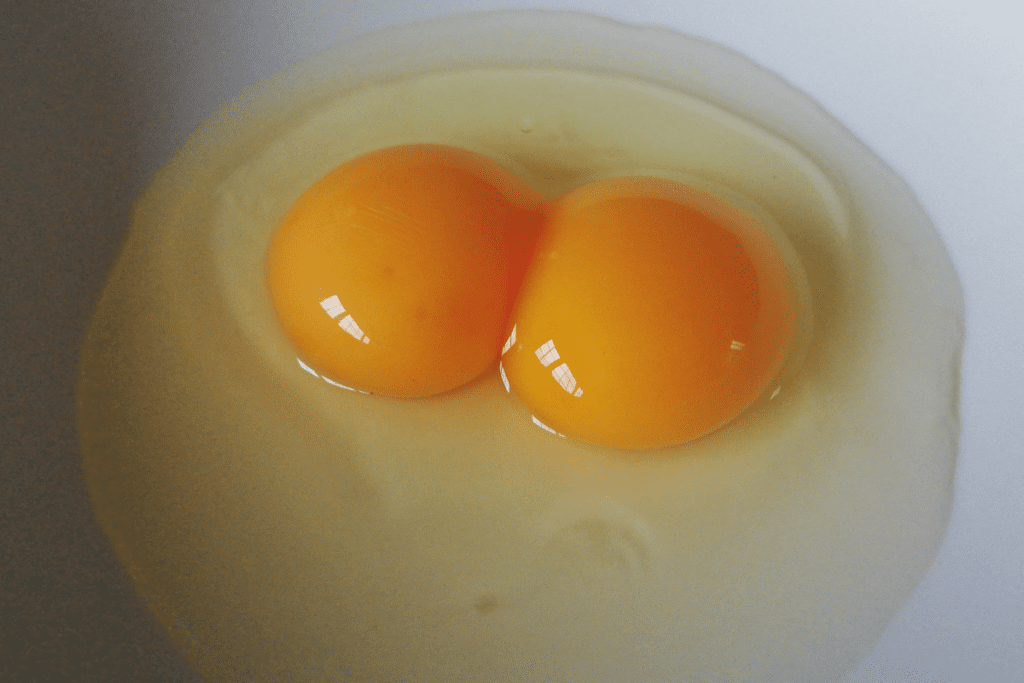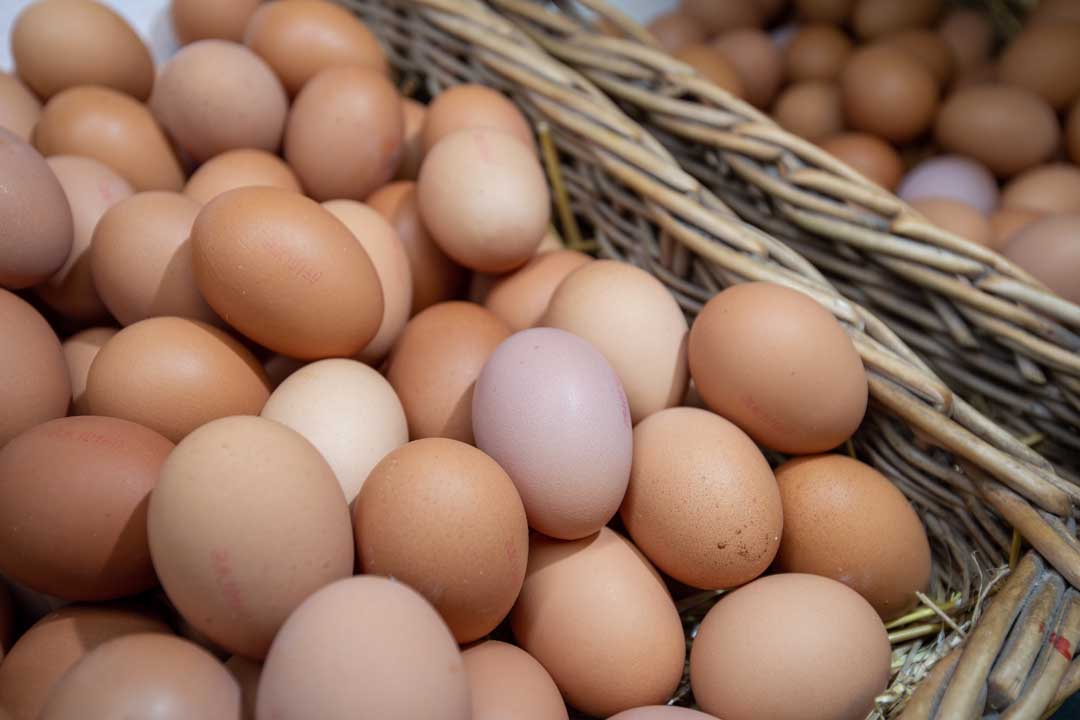In the UK this year it is estimated that we will eat a total of 12.4 billion eggs. That’s a lot of eggs to scramble, fry, boil and poach! Clearly one of our favourite foods, we spoke with Darwen Market traders who according to our calculation sell in the region of 3600 eggs a week. In fact, it’s probably the most sold/purchased item on the entire market.
Why are eggs so good?
 Egg yolks are one of the few foods that are a naturally good source of Vitamin D and the yolk colour of these magical parcels of joy very much depends on the diet of the hen and can range from pale yellow to deep orange. The deeper the orange the better the egg.
Egg yolks are one of the few foods that are a naturally good source of Vitamin D and the yolk colour of these magical parcels of joy very much depends on the diet of the hen and can range from pale yellow to deep orange. The deeper the orange the better the egg.
A deep orange yolk means the egg is from free range hens. This colour egg yolk indicates a well-balanced and healthy chicken diet and an egg with excellent nutritional value, it’s not hard to believe that a healthy diet produces a healthy egg! Free range chickens have access to the outdoors, with fresh greens such as clover or grass, and plenty of insects to supplement their diet. Chickens are omnivores and eat worms, grubs, mealworms, beetles, grasshoppers, crickets, ticks, spiders and even mice, moles, and small snakes!
How should we store them?
Eggs age more in one day at room temperature than in one week in the refrigerator so that busts the “where do you store your eggs” myth. If you are going to put them in the fridge then try not to store them in the fridge door, but in the main body of the fridge to ensure that they keep a consistent and cool temperature.
You can freeze eggs but you need to separate them – the yolks from the whites – and not just put a box of eggs in the freezer or each one in a different drawer in the freezer 😉 If you are freezing eggs break and separate the eggs, one at a time, making sure that no yolk gets in the whites, pour the whites into freezer containers, seal tightly, label with the number of egg whites and the date, and freeze. When it comes to freezing egg yolks the gelation property of yolks causes it to thicken or gel when frozen, so you need to give yolks special treatment. If you freeze them as they are, egg yolks will eventually become so gelatinous that they will be almost impossible to use in a recipe. To help slow down this gelation, beat in either 1/8 teaspoon salt or 1 1/2 teaspoons sugar of egg yolks (about 4 yolks). Label the container with the number of yolks, the date, and whether you’ve added salt (for main dishes) or sweetener (for baking or desserts), you really wouldn’t want to get them mixed up when you defrost them.
When it comes to eggs, does size matter?
The size of the egg very much depends on the size of the chicken, basically bigger chickens lay bigger eggs. All hens start egg production laying pee wee or small eggs and gradually increase to a mature egg grade size of medium. Most markets sell three sizes: medium, large, and extra-large, with large being the most popular. Large eggs are also the standard used by cookbook authors so most recipes call for them. If you happen to have a different size egg than what your recipe requires it’s good to know when and how you can substitute the sizes.
The good news is that differences in egg sizes are surprisingly small, so unless you’re baking then it really doesn’t matter that much. The success of your recipe depends on the proportion of eggs especially in cakes, custards, and soufflés as baking is technically a science and one of the cases when size really does matter.
Heredity can cause some hens or breeds to have a higher propensity for double yolks, but it most often occurs in pullets or new hens that are just beginning to lay (never underestimate the joy of cracking open an egg to find it’s a double yoker!).
What’s the difference between hen, duck and goose eggs?
Eggs from ducks, quail, chickens and geese each have their own nutritional profile and distinct tastes. A goose yolk is much richer than a chicken egg, it’s larger and has a thicker texture. It also contains more cholesterol than a standard chicken egg, that means goose egg yolks make spectacular yolk only dishes, like crème brûlée and fresh pasta. The goose egg white is much thinner than a hen egg so it’s a disaster to try and whip it into meringue etc so don’t waste your time. The average goose egg is equivalent to roughly 3 chicken eggs.
When it comes to nutrition duck eggs and chicken eggs are pretty similar in their contents. But in most cases duck eggs come out on top. Duck eggs have a higher (good!) fat content, are higher in protein than chicken eggs, have a little bit more cholesterol than chicken eggs, contain more vitamins and minerals – such as iron, B12, folate and vitamin and are full of Omega-3 fatty acids.
Another thing to note, is that many people who are allergic to chicken eggs can tolerate duck eggs, but be sure to talk to your GP before giving that a try. Duck eggs have a richer flavour, are a bit creamier, which can be a positive or negative depending on your tastes. This difference in taste is most likely due to the higher fat content.
Duck eggs are a bakers secret ingredient, duck egg whites will give you fluffier cakes, taller meringue peaks, and lighter cookies. The secret is in the higher protein content of duck egg whites which make them easier to cook with. Duck eggs contain more albumen, which gives them more structure, creating a very light, fluffy, and rich baked good with a higher lift than those made with chicken eggs so next time you have your baking hat on why not give duck eggs a try. Duck eggs stay fresher longer, due to their thicker shell so if you’re decorating eggs for Easter then a duck egg is a little bit hardier.
Where to get your eggs on the Market.
Jeanette at J Parr & Sons, the chicken and egg stall, has a great selection and all her eggs come from Longton and Wheelton.
Verity from Rushton’s the Bacon Stall offers eggs from Chorley and has hidden boxes of double yokers!
Tom at Turner’s butchers sells his own eggs from his back garden and most of his duck eggs are laid and picked on the very day that you buy them, how fresh is that! He also has eggs for sale from Ramsgreave near Mellor.
Leeming’s eggs are from Tockholes (did you know that they have been trading in the market for 60 years!). Contrary to the impression you get at the supermarket, eggs have a season and so the eggs on the stall here will very much depend on laying days.
One thing you can guarantee though, all of the eggs sold on the market are fresh and local. Plus they are sold in cardboard boxes – there’s no plastic here – so don’t forget to take back your empty egg boxes and fill them up again!
Have an ‘Eggcellent Easter’ and we’d love to see what you get up to with your eggs whether you’re cooking, baking or decorating! Share over on our Facebook Page 🙂







